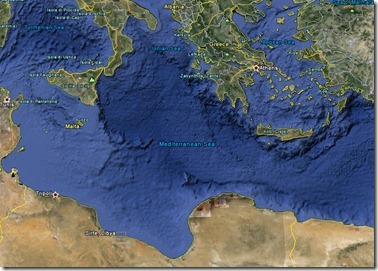A headline in the Jerusalem Post catches my eye: “Libya interim rulers set Saturday ultimatum for Sirte.” The first paragraph identifies Sirte as Muammar Gaddafi’s hometown. The name sounds familiar and I turn to Acts 27:17 where it says of the sailors carrying Paul to Rome: “Fearing that they would run aground on the sandbars of Syrtis, they lowered the sea anchor and let the ship be driven along.”
Sirte sounds a lot like Syrtis and so I wonder if the city is perhaps along Libya’s northern shore. Google Maps confirms that it is.
I open up the article on “Syrtis” in the Anchor Bible Dictionary and learn that this is the name of two dangerous gulfs off the coast of modern Libya. In that article, Mark J. Olson identifies the Greater Syrtis with the modern Gulf of Sirte:
According to Strabo (2.5.20), the Greater Syrtis covered an area approximately 450–570 miles in circumference, and 170–180 miles in breadth. This is the modern Gulf of Sirte, off the coast of Libya. The Lesser Syrtis is the modern Gulf of Gabes off the coast of Tunisia. The ancient mariners’ fears of running aground while still far out at sea are echoed in Dio Chrysostomus’ warning: “Those who have once sailed into it find egress impossible; for shoals, cross-currents, and long sand-bars extending a great distance out make the sea utterly impassable or troublesome” (Or. 5.8–9)” (6: 286).
I don’t think this helps me understand the passage in Acts better, but it may help me to remember the name of Syrtis. And it does provide a modern connection when teaching students today.
A search on Google reveals that Peter Kirk has observed this connection. He wrote in March, “How appropriate it is that a biblical place of danger has now become a place of danger for Gaddafi.”
In January I recommended Gordon Franz’s article, “Why Were the Sailors Afraid of the Syrtis Sands (Acts 27:17)?”
This screenshot from Google Earth shows Sirte in relation to Crete, Paul’s place of departure. The ship was not destroyed by the sandbars of Syrtis but instead sailed west and was wrecked on the island of Malta (Acts 28:1).

One thought on “Gaddafi and the Bible”
Glad you mentioned Gordon's excellent article. Surely clears up the Acts passage for me.
Thanks, also, for making the connection to the current situation in Libya.